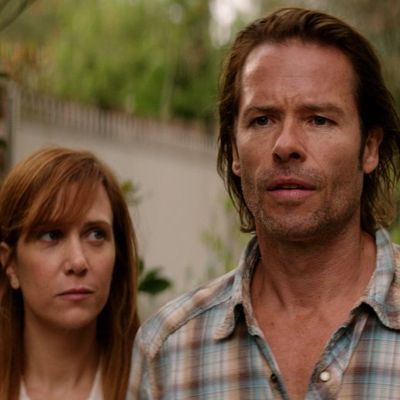
This is going to sound strange, but Hateship Loveship might have been a better movie had Kristen Wiig been a lesser actress. The central role in this Alice Munro adaptation, about a dim-bulb domestic caretaker who falls for the neÔÇÖer-do-well father of the teenage girl sheÔÇÖs supposed to be watching, has been conceived as something of a blank slate, a void from which, slowly, a broken human must emerge. But Wiig radiates too much intelligence for the part. Even at her most deadpan, her face and her body find minute bits of business to convey her discomfort. ThereÔÇÖs something going on behind those wide, questioning eyes and that tensely closed mouth. The movie just doesnÔÇÖt know what to do with it. Hateship Loveship is in no way a comedy, but WiigÔÇÖs enormous presence threatens to make it so. She canÔÇÖt disappear into the void, so the drama onscreen becomes hard to take seriously.
As the movie opens, quiet, cloistered Johanna (Wiig) discovers that the elderly woman she has spent a good part of her life taking care of has just died. Suddenly unleashed into a world she knows almost nothing about, the almost catatonically shy and clueless Johanna gets another gig ÔÇô working as a domestic for an older man (Nick Nolte) and watching over his teenage granddaughter Sabitha (Hailee Steinfeld). Sabitha has lost her mother, the result of an accident caused by her junkie father Ken (Guy Pearce), who lives hours away in Chicago but still makes the occasional desperate attempt to get back into his daughterÔÇÖs life.
Playing the kind of cruel joke that teenagers often do in movies like this, Sabitha and her best friend Edith (Sami Gayle) concoct an elaborate false correspondence between Ken and Johanna, sending her torrid letters and emails purporting to be from him. The naive, helpless Johanna gets sucked into their web of lies. And one day, she leaves everything and heads to Chicago to be with Ken. He, of course, knows nothing of this; he just met her briefly. But to his credit, he lets her stick around.
Is Johanna the real protagonist of this story, or is she simply the vessel through which we explore the workings of this troubled, cracked family? ItÔÇÖs hard to decide, and IÔÇÖm not sure director Liza Johnson (who made an excellent returning vet drama called Return several years ago) and screenwriter Mark Poirier have figured it out either. We follow Johanna for much of the movie, but the perspective is just as often fractured, as when we start to follow NolteÔÇÖs family patriarch as he starts a romance with a local bank employee (Christine Lahti). This wouldnÔÇÖt necessarily be a problem ÔÇô plenty of movies tell subjective stories from multiple perspectives ÔÇô except that the balance here feels off. We get bursts of detail about characters and subplots the movie then abandons swiftly. Jennifer Jason Leigh shows up briefly as KenÔÇÖs girlfriend, has a nice little moment or two and then vanishes. SabithaÔÇÖs friend Edith plays a key role in punking Johanna into thinking KenÔÇÖs in love with her, and then she practically evaporates, too. Meanwhile, SabithaÔÇÖs attitudes about her father and JohannaÔÇÖs relationship seem to change overnight. We feel at times like weÔÇÖre seeing scattered scenes from a longer movie.
And then thereÔÇÖs the aforementioned problem of the central character, and performance. The film might have worked if Johanna was less pronounced a presence, a cypher who by naively crossing boundaries put these people back together. But Wiig canÔÇÖt help but draw attention to herself. SheÔÇÖs always doing something, because itÔÇÖs impossible for her to just be; sheÔÇÖs too technical an actress for that. And so, every little movement or glance seems purposeful. WhatÔÇÖs supposed to be guileless and unformed starts to feel like shtick.


